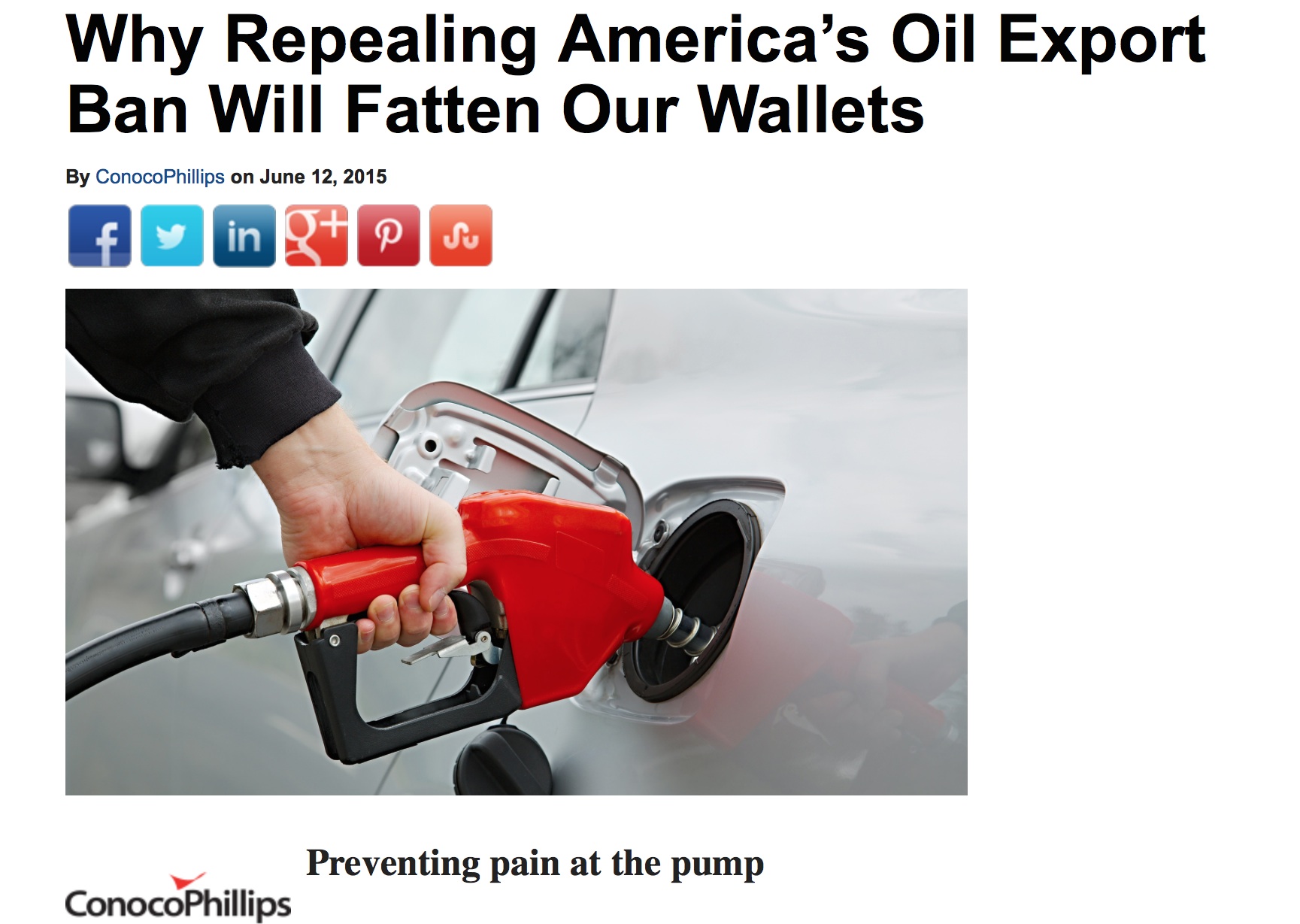It can be difficult to win an argument when you have no viable position. However, when you are the oil industry, you can just buy the win. Which is what the oil industry is poised to do regarding the lifting of the crude oil export ban.
The GOP is currently holding up Congressional action needed to avoid a government shutdown by demanding inclusion of the lifting of the crude oil export ban in the government spending package.
Here are some of the disingenuous arguments the oil industry has paid to have members of Congress make over the past two years.
Crude Exports Are Bad News for the American People, But Industry Flips This
In 2014, when oil and gasoline prices were considerably higher, the main argument made by members of Congress and industry-funded think tanks for lifting the crude oil export ban was that it would lower gas prices. Much like the oil and coal industries argue that their motivation is simply to lift the people of the world out of poverty, the argument was that the effort to lift the ban was motivated by the industry’s unselfish and altruistic goals to help the average American.
This led to paid placements like the one from ConocoPhillips with unintentionally honest headlines like, “Why Repealing the Oil Export Ban Will Fatten Our Wallets.”
Somewhere a copywriter with a conscience was smiling when they realized they got that headline past the ConocoPhillips marketing staff.
To realize how shameless this argument is, it is just necessary to listen to the last two CEOs of ExxonMobil.
Lee Raymond was CEO of ExxonMobil until 2005. According to Steve Coll’s book Private Empire, when Raymond was asked if ExxonMobil would build more refineries in the U.S. to help America he replied, “I’m not a U.S. company and I don’t make decisions based on what’s good for the U.S.”
In 2013, Rex Tillerson, the current ExxonMobil CEO kept it simple for Charlie Rose.
“My philosophy is to make money,” Tillerson said, “If I can drill and make money, then that’s what I want to do.”
So much for helping the average American consumer. However, as oil prices have crashed over the past two years, the industry has moved on to other false arguments.
It Is About National Security, Just Not for the Reason Industry Spins It
The next argument for lifting the ban was that it would be good for America’s national security to export oil — a complete reversal from the last 40 years of talking about keeping America secure by drilling our way to “energy independence.”
The argument is essentially that America could send oil to our allies who are currently forced to buy oil from Iran and Russia. Lifting the ban would allow oil sales directly to allies, such as Japan or South Korea.
There are two glaring problems with this argument. The first is the export destination for the oil will be up to the oil companies, not the government. So the oil might go to our allies if they are willing to pay more than China. If not, it will go to China.
The second problem is that with sanctions about to be lifted on Iran, our allies like Japan and South Korea are lining up to get more Iranian oil. So while Congress has heard testimony from the likes of Harold Hamm, CEO of oil fracking giant Continental Resources, about how our allies are “forced” to buy oil from Iran, the reality is the opposite.
And guess who is also angling to get big contracts to produce oil in Iran? ExxonMobil.
Additionally, ExxonMobil owns more land in Russia than it does in the U.S.
In addition to the failure of the national security argument on the merits, former Naval commander Kirk S. Lippold recently wrote the following:
As I have warned in my recent testimony at a congressional hearing on lifting the ban on U.S. oil exports, by ensuring continued reliance on oil imports, domestic crude exports will directly threaten American energy independence and national security. I have experienced firsthand — particularly in my command of the USS Cole when it was attacked by al-Qaida terrorists — the devastating effects of reliance on imported oil when our forward-deployed assets are placed in harm’s way. (emphasis added)
Along with saying oil exports will threaten national security, Lippold told Congress that he expects much of the oil will go to China.
How selling America’s oil to China provides America with energy security has yet to be explained.
Lifting the Ban Would Mean Far More Global Warming Emissions, the Opposite of Industry’s Climate Claims
How would fracking an additional 3 million barrels per day (or more) of oil impact the climate? Would you believe it would be good for the environment?
In a recent New York Times piece on the inevitability of the lifting of the ban, they allowed Sen. Bill Cassidy (R-La.) to argue just that.
“Both on an economic and national security, and I might add, environmental basis,” Mr. Cassidy said, “there’s such a strong case for allowing U.S. export of oil.”
The Times did not include an explanation on how there was a strong case for allowing exports on an environmental basis.
Sen. Cassidy is not alone in this approach. Former Secretary of the Treasury Larry Summers made similar claims. And as noted on DeSmog, two of the four reports the Government Accountability Office reviewed regarding the impacts of lifting the ban didn’t even address potential environmental concerns.
So increased flaring, methane leakage, increased oil-by-rail traffic, water contamination from fracking and other real environmental dangers have been effectively removed from the conversation.
In one particularly outrageous statement while testifying in Congress, Dr. W. David Montgomery of NERA Economic Consulting claimed, “the activity of producing oil itself is not going to increase greenhouse gas emissions.”
Fool Me Once
While still learning about the extent of ExxonMobil’s lies about fossil fuels and climate change, it appears Congress will happily buy into the current disinformation campaigns to grant Big Oil its top wish.
Will December 2015 be remembered by energy historians for the historic outcome of the COP21 talks in Paris, or will it be better known as the time in history when US politicians once again caved to the oil industry and unleashed decades of fracking on the country and the climate?
Blog Image credit: Oil pumpjack on American flag, via Shutterstock.
Subscribe to our newsletter
Stay up to date with DeSmog news and alerts







